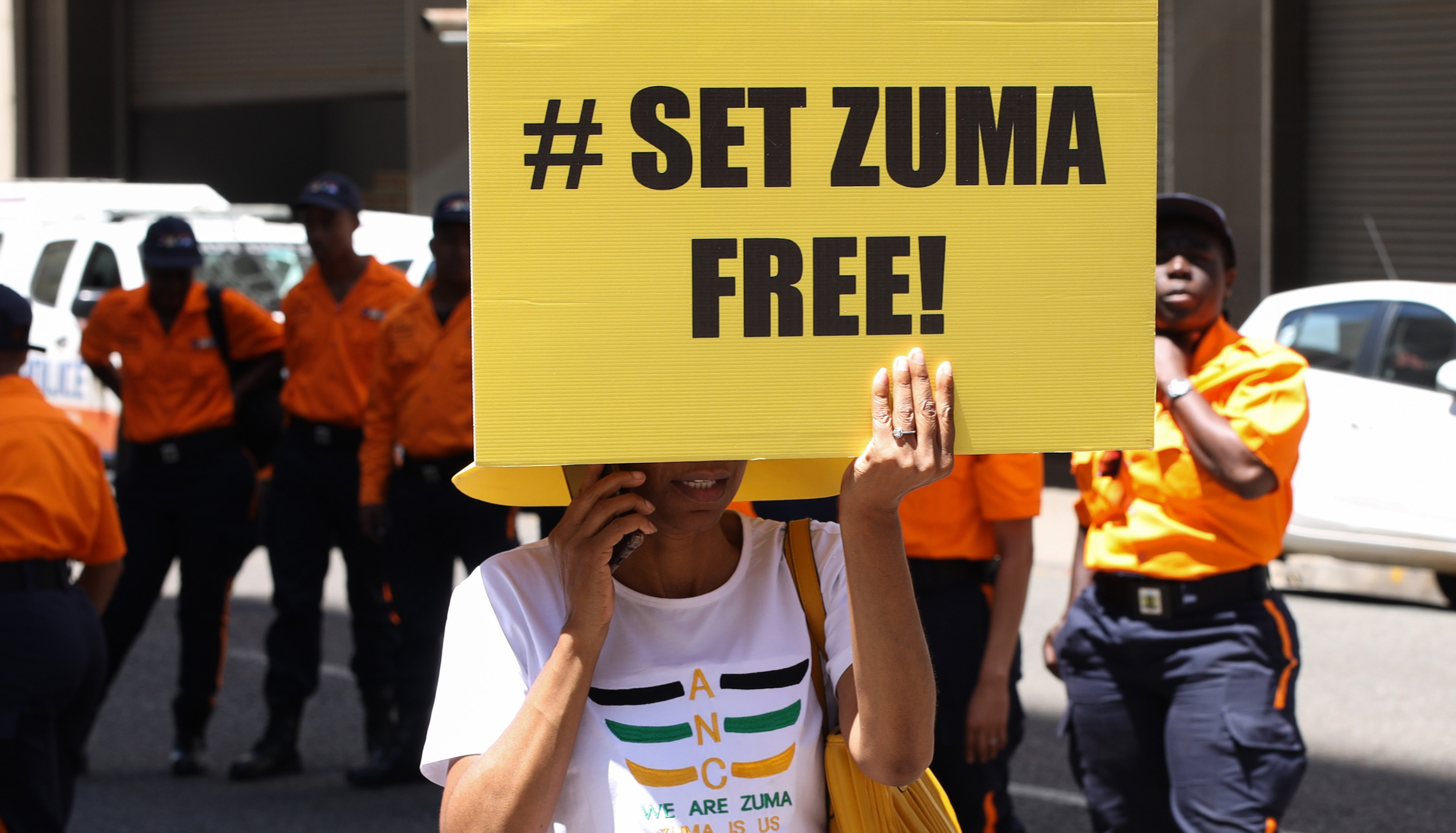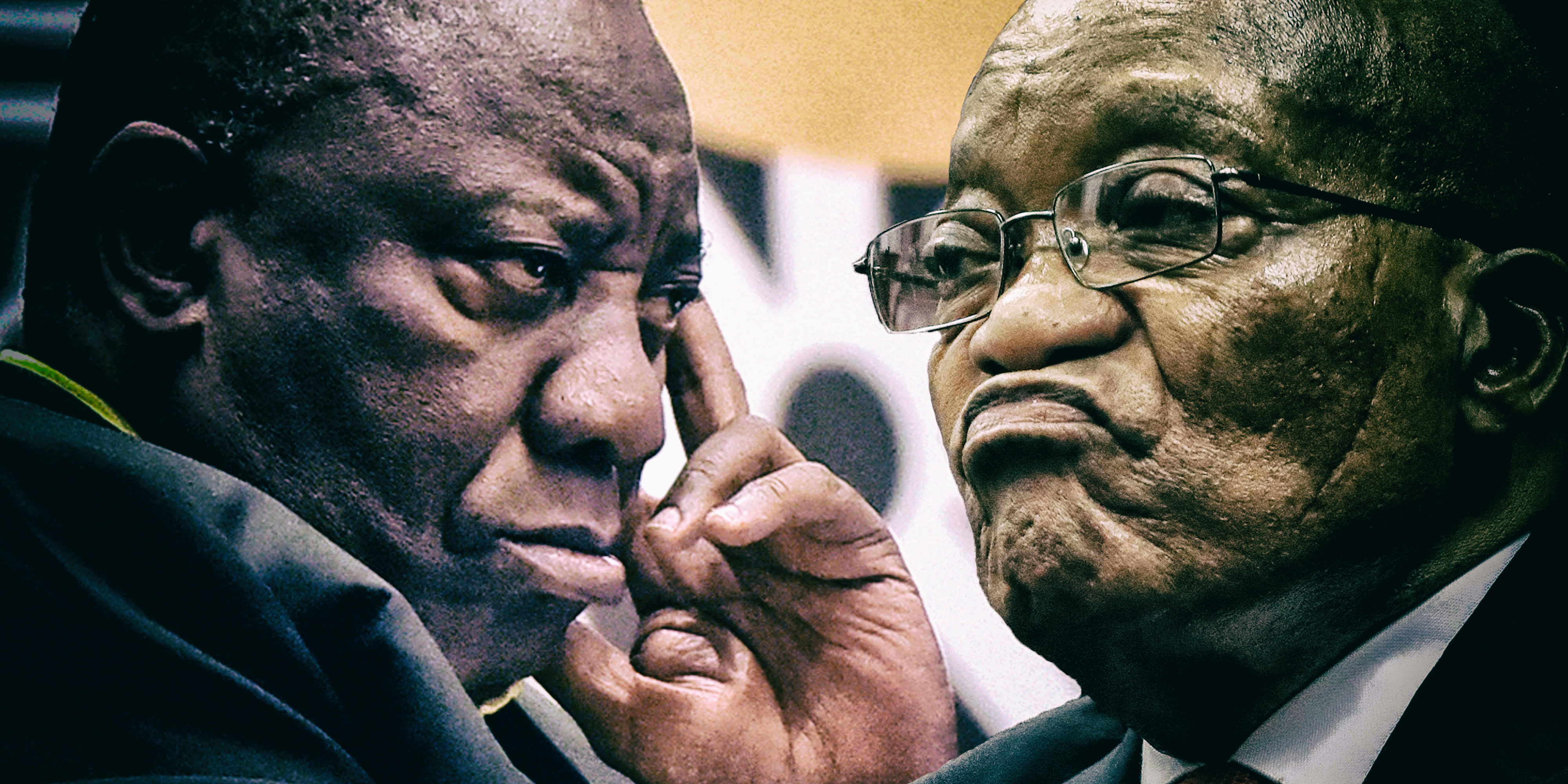Despite being in and out of courtrooms on numerous occasions for years, former president Jacob Zuma had “never” thought that attending court as an accused was “beneath him”, advocate Dali Mpofu SC told a Full Bench of the Johannesburg High Court in a civil hearing on Thursday.
Mpofu was representing Zuma in his opposition to President Cyril Ramaphosa seeking an urgent interdict to stop his appearance in a criminal court on 19 January, for the private prosecution Zuma has brought against him.
Read more in Daily Maverick: “Zuma ‘desperately’ trying to link private prosecution cases for ‘ulterior purpose’ – Ramaphosa”
Ramaphosa contends that the endeavour is invalid, unlawful and unconstitutional.
 A supporter of former President Jacob Zuma outside the Johannesburg High Court on Thursday, January 12 2023 during President Cyril Ramaphosa’s interdict application against Zuma. (Photo: Gallo Images / Luba Lesolle)
A supporter of former President Jacob Zuma outside the Johannesburg High Court on Thursday, January 12 2023 during President Cyril Ramaphosa’s interdict application against Zuma. (Photo: Gallo Images / Luba Lesolle)
The interdict application made by the President smacked of “arrogance”, Mpofu told judges Roland Sutherland, Edwin Molahlehi and Marcus Senyatsi, and was not a matter for the civil court.
“What we have here is a simple, pedestrian charge. A person has been charged and must come to court,” said Mpofu. Any issues Ramaphosa had relating to the private prosecution could be aired in a criminal court, he said.
A civil court did not have the capacity to understand the “nuances” that a criminal court did, said Mpofu, who denied there was any urgency to the application.
“Any person in this country who is accused of a crime, rightly or wrongly, has to suffer the inconvenience of attending court,” he said.
Zuma initiated the private prosecution of Ramaphosa on 15 December, the day before the governing party was to start its national elective conference, the conclusion of which saw Ramaphosa being voted in for a second term as ANC president. The timing of the summons led Ramaphosa to initially accuse Zuma of attempting to scupper his chances of re-election.
The former president has accused Ramaphosa of being an accessory after the fact to criminal conduct or, alternatively, of defeating or attempting to defeat the ends of justice, relating to the alleged unauthorised disclosure of medical information in Zuma’s private prosecution of veteran prosecutor Billy Downer — who will be prosecuting the Arms Deal graft trial in which Zuma is accused number one — and journalist Karyn Maughan.
Read more in Daily Maverick: “Groundhog Day — Zuma (yet again) insists that Billy Downer must not prosecute him in Arms Deal corruption trial”
Mpofu said he had not wanted to talk about the ANC conference and the party’s “step-aside” rule, but was being “forced into it” by advocate Ngwako Hamilton Maenetje SC, who was acting on behalf of the President, and who had made his arguments to the court before Mpofu.
Zuma contends that Ramaphosa’s urgency was first based on the ANC conference, which had now come and gone. In his heads of argument, Ramaphosa argued that: “What he doesn’t add is that [Ramaphosa] will have to step aside as ANC president and [SA] President if he is criminally charged. That is the urgency.”
According to Mpofu, though: “The entire step-aside debate is evidence that the court should not grant this relief. On their own version, the step-aside rule kicks in when you are charged. That happened already on 15 December [when Zuma issued Ramaphosa with a first “defective” summons].
“So, let’s say the court grants the relief; the step-aside rule is still operational. Only two things can get [Ramaphosa] out — if the summons is set aside or if the private prosecutor [Zuma] withdraws the whole thing. Apart from those, if he is vulnerable to step-aside, he will still be vulnerable to it whether this relief is granted or not.”
If the matter had been so urgent, he said, Ramaphosa would have responded to the summons expeditiously instead of “ignoring” it for more than 10 days in December before finally responding with a letter marked “urgent”.
Maenetje told the court that Zuma had indicated no intention that he was willing to postpone the 19 January criminal court appearance. “He won’t budge,” he said.
“No one is entitled to haul you before a criminal proceeding [that is invalid and unconstitutional]”. Ramaphosa’s rights would be “trampled on” if he was to appear, said Maenetje.
Zuma is expecting Ramaphosa to appear in court next week and enter a plea. Should Ramaphosa fail to appear, Zuma will issue a warrant for his arrest, according to the former president’s heads of argument.
Visit Daily Maverick’s home page for more news, analysis and investigations
At the outset of the hearing, Judge Sutherland told the parties that Zuma not having paid a security deposit (a prerequisite for a private prosecution, along with a nolle prosequi certificate) before a summons was issued on Ramaphosa, was not something the Full Bench was interested in hearing. Judge Molahlehi concurred, later saying it was a “technical matter” that could be fixed.
Maenetje reiterated that the position of a private prosecution was different to a public one. In the latter, if the National Prosecuting Authority issued a summons for a person to appear in court, all the necessary conditions had already been met.
All private prosecutions had to comply with the Criminal Procedure Act, he said, which Zuma’s did not.
Referring to cases quoted by Mpofu, he said those were all prosecutions brought by the State, not individuals. As for private prosecutions, the high court had jurisdiction to put an end to them, he said.
The courts had to protect citizens from unlawful private prosecutions, he said.
A private prosecution could only take place if a nolle prosequi certificate had been issued by the prosecuting authority, said Maenetje, and the certificates Zuma was relying on to privately prosecute Ramaphosa did not apply to him. Instead, Zuma was relying on certificates issued in relation to Downer and Maughan.
Zuma is privately prosecuting Downer and Maughan for allegedly colluding to “leak” his private medical information, submitted as part of other documentation in the Arms Deal case, and contends Ramaphosa failed to act when he was told about such. This, says Zuma, placed Ramaphosa in contravention of section 41(6)(a) and/or (b), read with section 41(7) of the National Prosecuting Act.
Zuma’s legal team wrote to Ramaphosa on 19 August 2021 seeking that an investigation be launched into the alleged breach by Downer and Maughan, which took place on 9 August 2021. The President responded on 25 August 2021 that the matter, “[which] we view in a very serious light”, had been referred to Justice and Correctional Services Minister Ronald Lamola. Ramaphosa said in the same response that he had asked that Lamola refer it to the Legal Practice Council.
Zuma contends that because the matter was not followed through by Ramaphosa, he enabled Maughan and Downer to evade liability and thus harmed Zuma’s “dignity, privacy, bodily integrity and security rights”.
Ramaphosa has made it clear that he is not at liberty to interfere with investigations, something Maenetje reiterated in court.
“The President is not the authority to investigate crime. There are authorities that the Constitution says are law enforcement agencies. This person [Zuma] was himself a president, he knows this. There is something unsound in the request if he expects [Ramaphosa] to investigate a crime when it is before a court.”
Judgment was reserved for Monday morning. DM




 Supporters of former President Zuma supporter outside the Johannesburg High Court on Thursday, January 12, 2023 during President Ramaphosa’s interdict application against former President Jacob Zuma. (Photo: Gallo Images / Luba Lesolle)
Supporters of former President Zuma supporter outside the Johannesburg High Court on Thursday, January 12, 2023 during President Ramaphosa’s interdict application against former President Jacob Zuma. (Photo: Gallo Images / Luba Lesolle)